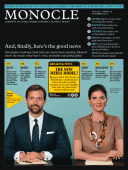
Issue 47
For the October issue of Monocle our writers and photographers report back on the state of the global media industry.
In This Issue
Oops! No content was found.
Looks like we no longer have content for the page you're on. Perhaps try a search?
Return Home

